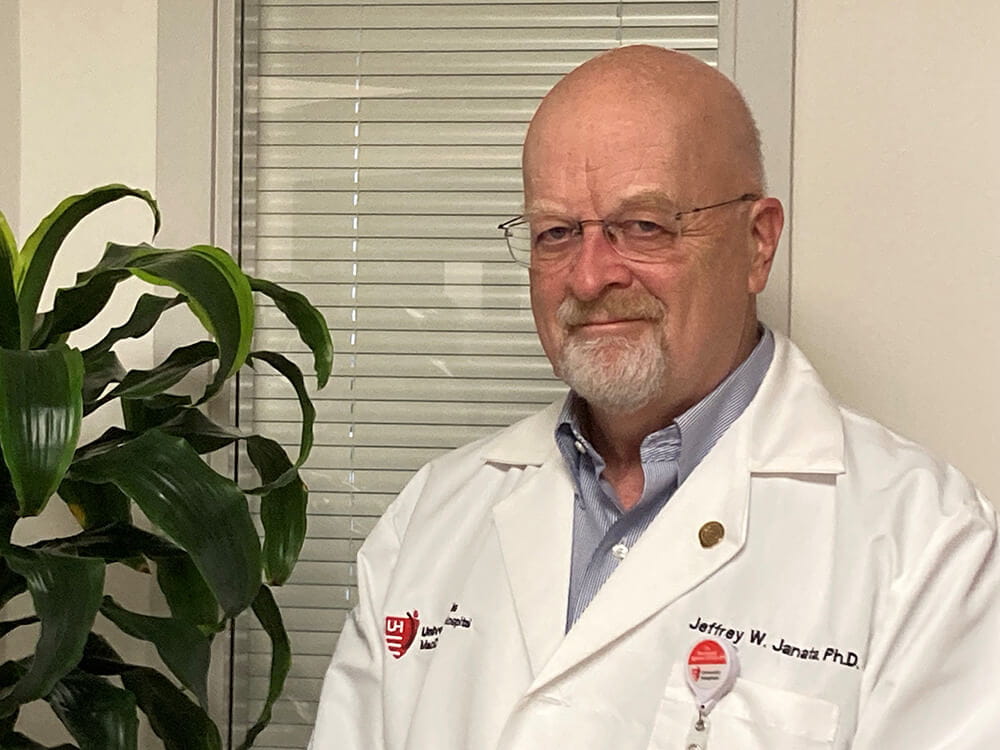Medical Psychologist Dedicates His Life to Helping People in Pain
March 24, 2022
Jeffrey Janata, PhD, Chief, Division of Psychology, University Hospitals Cleveland Medical Center and the Sihler Family Professor of Psychiatry, Case Western Reserve University School of Medicine, understands the emotions that people experience during health crises and knows how to help. Dr. Janata is a Medical Psychologist who treats patients with medical conditions accompanied by psychological distress.
 Jeffrey Janata, PhD
Jeffrey Janata, PhD“In the University Hospitals Psychological Division, in the Department of Psychiatry, we have programs that treat patients experiencing chronic pain, cancer, diabetes, eating disorders, women’s health, and a series of neurological conditions like Parkinson’s disease, multiple sclerosis, and epilepsy,” he said.
“These medical conditions have profound psychological components. Our goal is to reduce or eliminate the patient’s negative emotions or their behavior’s effect on their disease, which can make the illness worse.” Dr. Janata clarified, “Our behaviors influence our health, and our health influences our psychology.”
Dr. Janata specializes in treating patients experiencing chronic pain as a part of the Pain Management Institute and has worked at University Hospitals Cleveland Medical Center for 35 years. In college, he was interested in experimental psychology. “I liked the science component of experimental psychology, but I couldn’t imagine working in a laboratory full-time.”
“Early in my career, I was fortunate enough to work in a cardiothoracic surgery unit,” Janata said. These patients were often experiencing psychological distress due to their severe illnesses. That was when Dr. Janata knew the kind of work he wanted to spend the rest of his life doing. As a result, he began to explore the clinical applications of psychology and entered a doctoral program at Case Western Reserve University.
“Medical psychology was complex enough to be engaging, and honestly, that single experience in the cardiothoracic department changed my direction completely,” Dr. Janata said.
Dr. Janata focuses on understanding the patient as an individual before offering strategies to help. “No two people, their health, or mental health are identical. “As a medical psychologist, I have to take the time to understand how an illness has affected a patient personally and socially. We know that people do best when guided to make decisions about their treatment that they feel are their own.” This approach is called biopsychosocial, which entails understanding the patient’s disease and how they are adjusting to it.
Another significant component of Dr. Janata’s role is training physicians to recognize when a patient is psychologically distressed. “Our programs teach physicians how to best interact with their patients and be attentive and sensitive to issues they might not otherwise bring up. For example, a patient might say, “I’m in pain. But what he is unable to say is, “I’m in pain, and it has affected my lifestyle, my income, and my relationships.” Our job is to understand the patient’s issues more fully and identify the pervasive ways health and mental health intersect,” Dr. Janata explained.
Dr. Janata says that COVID-19 has raised the country’s awareness of mental health. “However, that heightened consciousness has dramatically increased the volume of patients seeking our services. In the UH Department of Psychiatry, the increase in people seeking assistance eclipses our ability to meet the need.”
And like there is a shortage of nurses and other healthcare professionals, there is a severe shortage of psychologists.
“We don’t have enough mental health professionals to treat the volume of people seeking help. Despite having a significant number of psychology majors in our undergraduate institutions across the country, most of them go into careers other than psychology or psychiatry. And we have too few psychology graduate programs,” Janata said.
These days, Dr. Janata dedicates most of his time to education and research but still sees patients 40 – 50 percent of the time. As Division Chief, Dr. Janata says that his job is to let smart people do their jobs. “Either I stay out of their way or provide the tools or support they need. We have an exceedingly capable, competent, and highly educated group of psychologists who do terrific work.” This past fall, Janata became an endowed professor of psychiatry, which underscores his professional accomplishments and outstanding work.
Janata has thoroughly enjoyed his long career at University Hospitals in Cleveland. “Fundamentally, I am at UH because I enjoy working with bright, committed, and hard-working people. This academic medical center has always been open to novel ideas; I was welcome even though my training background differed from my colleagues. I’ve always enjoyed working in teams, and the stimulation from our collegial interactions is outstanding.”
Tags: Physician Recognition, Psychology


